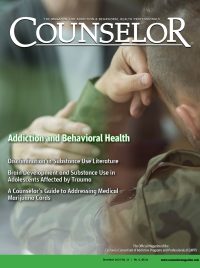Share
Parents of individuals with substance use disorders (SUDs) must have a high tolerance for aberrant behavior. My two sons struggled for decades with addiction to heroin and are both now in long-term recovery. This is a glorious time for renewing trust in our family, and although I always proclaimed I would never give up hope, I did have some days of despair and am relieved and grateful that we are here.
In looking back at those excruciatingly difficult experiences, beyond the daily worry for their lives and the dread of the next chapter of unfolding drama and trauma that we lived through, I am struck by how destructive the lies were as well.
Lying is an intrinsic part of substance use. There are several reasons why people with SUDs may lie (Vertava Health Ohio, 2021):
- Shame: People with SUDs are often ashamed of their behavior or have a fear of rejection and societal judgement, so they use lies to cover their tracks.
- Avoiding Confrontation/Discovery: Individuals in active addiction may hide their behavior to avoid arguments with their loved ones. Instead, they will use lies to keep you from asking questions and keep themselves from being found out.
- Protecting Loved Ones: Those with SUDs know that what they are doing will hurt their loved ones and may lie to keep their families from feeling disappointment, pain, or concern.
- Biology: SUDs cause the brain to rewire itself in a way that makes getting high or drunk the primary focus for these individuals. As a result, lying, stealing, and cheating become excusable if it means getting more of the substance.
- Denial: Sometimes people with SUDs are not just lying to you, they are also lying to themselves to avoid admitting they have a problem.
Chronic lying creates a complicated maze to navigate, intensifying anger and mistrust within a family. It is exhausting and draining to deal with dishonesty for both those perpetuating the lie and for those who must cope with it, always hoping that their loved ones are telling the truth, and trying against all reality to believe them.
Another behavior that so many families have to endure is stealing—often of precious heirlooms and medicine. It is very difficult not to take this as a personal affront, but the reality is that these individuals are usually stealing in order to support their addiction, not to intentionally hurt parents or other loved ones. People with SUDs may have the delusion that they are simply borrowing in order to survive another day of addiction. For us as parents, dealing with these issues feels like a dangerous walk on a tightrope, as we navigate when helping is actually helpful and when it is hurting. Anger is fruitless, as this is not really about you, it is about their own hellish journey. As family members we must be willing to listen without criticism, judgment, or disdain.
People in recovery who have past criminal justice involvement are often confronted with the decision to lie about their past in order to get a job, be accepted for school, get housing, or even be accepted in social circles. This must change, as even a small white lie of omission can be a trigger for relapse. It is a slippery slope. Rigorous honesty needs to be practiced in order to break long-entrenched patterns and behaviors. The danger of relapse is real and can lead to overdose death as tolerance levels have changed during sobriety. We are seeing far too many precious lives lost, so we as a society must become compassionate and tolerant partners in the reintegration and restoration process.
The good news is that many distasteful and upsetting behaviors can and often do disappear during recovery. I have personally witnessed the miraculous beauty of the renewal of mind, body, and soul with my sons and with so many other individuals who have found and are sustaining recovery.
Beyond the need for many pathways to recovery like counseling, addiction treatment, medication-assisted treatment (MAT) services, and recovery support services have been historically overlooked and undervalued, but they are extremely helpful and effective. My sons enjoy a robust recovery community that enhances their well-being.
The process of deep introspection is an integral part of recovery. It is a need to be honest to the core and to practice rigid truth-telling. I am glad that more people are speaking out to tell their stories. It is an important part of the process which cannot be minimized.
It is very hard to love without trust. The more we promote honesty through careful listening and meaningful interactions, the more we can enjoy the absolute pleasure of relationships that are funny, loyal, and true. I am in awe of the recovery community and grateful for the growth I have experienced through this difficult work. It is healing to be around people who are rigid truth tellers, and it has given my life deeper meaning and fulfillment.
References
Vertava Health Ohio. (2021). Addicts and lying: Why do addicts lie and what to do about it. Retrieved from https://vertavahealthohio.com/blog/addicts-and-lying/

Gretchen Burns Bergman
Gretchen Burns Bergman is the cofounder and executive director of A New PATH (Parents for Addiction Treatment & Healing) and lead organizer of the Moms United to End the War on Drugs national campaign.










 Counselor Magazine is the official publication of the California Association of Addiction Programs and Professionals (CCAPP). Counselor offers online continuing education, article archives, subscription deals, and article submission guidelines. It has been serving the addiction field for more than thirty years.
Counselor Magazine is the official publication of the California Association of Addiction Programs and Professionals (CCAPP). Counselor offers online continuing education, article archives, subscription deals, and article submission guidelines. It has been serving the addiction field for more than thirty years.